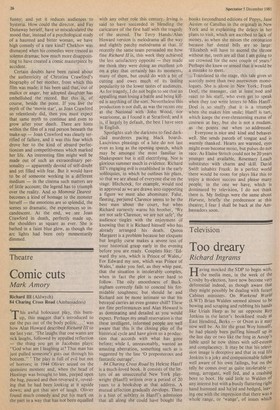Theatre
Comic cuts
Mark Amory
Richard III (Aid wych ) 84 Charing Cross Road (Ambassadors) it-T-1 his awful holocaust play, this burn ]. up, this maggot that's introduced to eat the pus out of the body politic... ' was how Alan Howard described Richard III to me last year. 'The laughs that one wants are sick laughs, followed by appalled reflection — the thing you get in Jacobean plays: "God what am I laughing at? That man has just pulled someone's guts out through his bottom." ' The play is full of evil but not of horrors; in 1944 Olivier seized on the queasiest moment and, when the head of Hastings was brought to him, peeped open the bag, paused and then reversed it, revealing that he had been looking at it upside down; and got that sort of laugh. Olivier found much comedy and put his mark on the part in a way that has not been equalled with any other role this century. Irving is said to have succeeded in blending the caricature of the first half with the tragedy of the second. The Terry Hands/Alan Howard version is melodrama all the way and slightly patchy melodrama at that. If recently the same team persuaded me how fine Richard 11 is, this week they achieved the less satisfactory opposite — they made me think they were doing an excellent job on a play that certainly has its moments, many of them, but could do with a bit of cutting and owes much of its lasting popularity to the lower tastes of audiences. As for tragedy, I do not begin to see that an appalling man losing a battle and being killed is anything of the sort. Nevertheless this production is not dull, as was the recent one at the National with John Wood, nor wearisome, as I found it at Stratford; and it is, if largely by default, the best I have seen in English.
Spotlights stab the darkness to find darkclad murderers pacing black boards. Lascivious pleasings of a lute do not last even as long as the opening speech, which may be amongst the most familiar in Shakespeare but is still electrifying. Nor is glorious summer much in evidence. Richard Ill's engaging evil is established in the early soliloquies, in which he outlines his plans, so that we are ahead of everyone else on the stage. Hitchcock, for example, would nod in approval as we are drawn into supporting a figure we must also abominate. False, fleeting, perjured Clarence seems to be the best man about the court, but when Richard earnestly warns his brother, `We are not safe Clarence, we are not safe', the audience tingles with the enjoyment of knowing that it is Richard himself who has already arranged his death. Queen Margaret is a problem because her eloquent but lengthy curse makes a severe test of your historical grasp early in the evening before you are ready. Couplets like: `Edward thy son, which is Prince of Wales,/ For Edward my son, which was Prince of Wales,' make you feel, as they whip past, that the situation is intolerably complex, when in fact the plot is never hard to follow. The oily smoothness of Buckingham correctly fails to conceal his formidable toughness; but should he and Richard not be more intimate so that his betrayal carries an even greater chill? These are fine performances and Alan Howard is as dominating and detailed as you would expect. Perhaps my small reservation is that these intelligent, informed people are well aware that this is the closing play of the historical cycle and have given us a production that accords with what has gone before; while I, unreasonably, wanted an amazing aberration, something such as is suggested by the line '0 preposterous and fantastic outrage'.
84 Charing Cross Road by Helene Hanff is a much-loved book. It consists of the letters of an unsuccessful New York playwright (Haat) written over a period of 20 years to a bookshop at that address. A mutual affection gradually develops. There is a hint of subtlety in Hanff's admission that all along she could have bought the books (secondhand editions of Pepys, Jane Austen or Catullus in the original) in New York and in explaining the delays in her plans to visit, which are ascribed to lack of money, as when she misses the coronation because her dental bills are so large: `Elizabeth will have to ascend the throne without me, teeth are all that I am going to see crowned for the next couple of years.-' Perhaps she knew or sensed that it would be a mistake to meet.
Translated to the stage, this tale gives us scarcely more than two interwoven monologues. She is alone in New York; Frank Doe, the manager, can at least nod and react to his staff, who even get to speak when they too write letters to Miss Hanff. Doel is so stuffy that it is a triumph when she makes him smile; Hanff is tart, which keeps the ever-threatening excess of cosiness at bay, but she is not a madam. as he points out when so addressed.
Everyone is nice and kind and behaves well. She sends parcels of tongue and is warmly thanked. Hearts are warmed, eyes might even become moist, but pulses do not race. As Elaine Stritch could not be 20 years younger and available, Rosemary Leach substitutes with charm and skill. David Swift inhabits Frank. In a perfect world there would be room for plays like this to enjoy a modest success and please many people; in the one we have, which is dominated by television, I do not think there is. My feelings were the same about Harvest, briefly the predecessor at this theatre; I fear I shall be back at the Ambassadors soon.










































 Previous page
Previous page